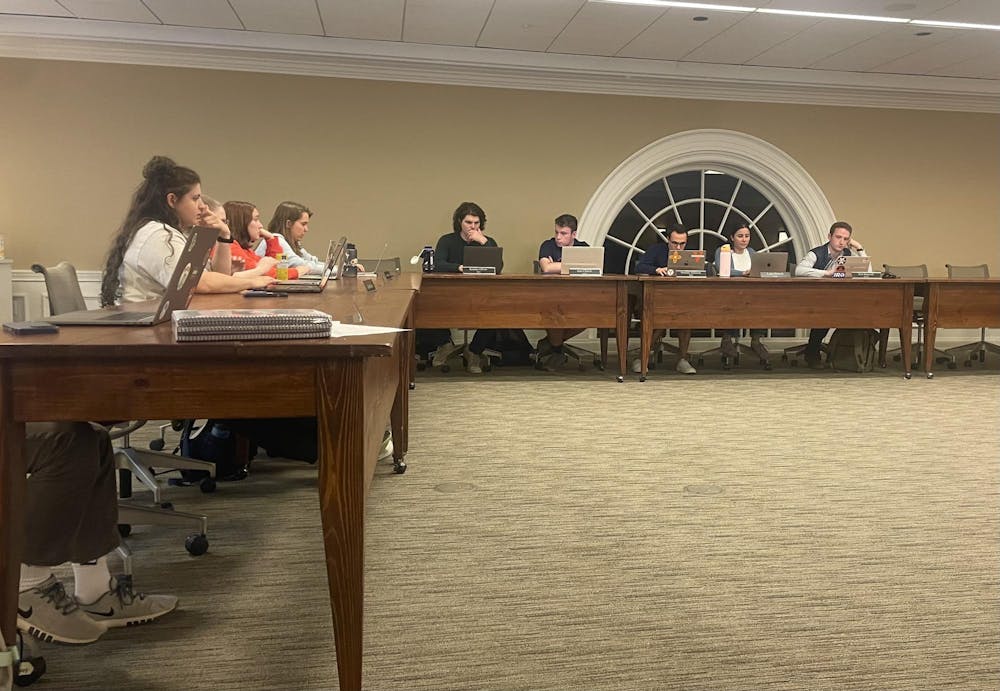The Honor Committee met Sunday and voted to pass new sanctioning bylaws that were first introduced in their Oct. 6 meeting. The bylaws outline a pre-sanctioning process where the Counsel for the Community — the support officer representing both the reporter and the Community of Trust in an Honor trial — has the opportunity to present their own arguments in a Panel for Sanctions, rather than relying solely on the reporter's input. This change addressed concerns that the reporter’s perspective has been overemphasized and the Community of Trust’s interests have been underemphasized in the sanctioning process.
The Committee also decided in favor of allowing reporters to be present during the Panel for Sanctions to read their Reporter Impact Statement — a document where the reporter outlines the personal impact of the offense. This addition ensures that the reporter's experience is still considered during sanctioning, in light of the shift in focus towards the Counsel for the Community presenting sanctioning arguments.
These changes were proposed by the Sanctioning Working Group, a group tasked with developing new sanctions and sanctioning procedures. The reviewed proposed bylaw changes were initially brought forward in the Committee’s Oct. 6 meeting.
In the proposed sanctioning process, the guilty student and the reporter fill out pre-sanctioning documents that aim to inform the Counsel’s sanctioning arguments. These include the guilty student's submission of mitigating factors — circumstances not included in the initial investigation that the student faced — and the reporter's Reporter Impact Statement, both of which must be submitted within 48 hours after a guilty verdict.
Following these submissions, the Counsel for the Community has another 48 hours to draft and present their proposed sanctions. This is a change from the SWG’s previous proposal — allotting 72 hours for each document — which raised concerns about a difficult time commitment for guilty students.
Will Hancock, SWG chair, vice chair for the undergraduate community and third-year College student, said that the pre-sanctioning documents are submitted electronically via email and will not interrupt the pre-sanctioning process — documents that are not submitted won’t be included in the sanctioning process. Hancock also suggested that if the 48-hour deadlines create time constraints, reporters could prepare their impact statements before the hearing for guilt, to eliminate concerns.
Seamus Oliver, vice chair for investigations and third-year College student, raised concerns about having reporters submit the Reporter Impact Statement before a guilty verdict. He said that the impact on the reporter and any suggested sanctions should remain separate, with sanctions being addressed only after a guilty verdict is reached — this prevents prejudgment and ensures that the statement is centered on how the offense affected the reporter, rather than influencing the panel with suggestions for sanctions prematurely.
"I don't want to hand that form to the reporter to fill out and have a section of what sanctions [they] are looking for … we are looking for the impact on the reporter," Oliver said.
Hancock said that the specifics of when the reporter submits the Reporter Impact Statement do not necessarily need to be written into the bylaws and can be adjusted later on, as they work to implement the pre-sanctioning process. He also asked the Committee to consider whether reporters should be allowed in the bylaws to attend the Panel for Sanctions to read their statement in person.
Oliver said that having the reporter read the statement in person to the panel seemed unnecessary, as a representative could easily read the submitted document.
"I see no reason for the reporter to show up just to read a document that has already been submitted… especially if they're not answering questions on the general position," Oliver said.
Cassidy Dufour, School of Law Rep. and School of Law student, said that allowing the reporter to read the statement in person could provide emotional closure and recognition of their experience.
"It’s more about also recognizing that there was a harm specific to [the reporter], and giving them the opportunity to have that closure and feel heard by the panel when they make that decision," Dufour said.
The Committee proceeded with two votes — the first on whether to adopt the new pre-sanctioning process, and the second on whether the reporter should have the option to be present to read their Reporter Impact Statement. They voted in favor of both proposals.
Although the pre-sanctioning bylaws were passed, Hancock said that further discussions are expected regarding the specifics of the Reporter Impact Statement submission process and additional sanctioning procedures.
Sunday’s meeting marked the first of the Committee’s voting days — a specific date where proposed bylaw changes are scheduled to be voted on, in an effort to maximize meeting attendance. The Committee will reconvene on Oct. 27 at 7 p.m. in the Trial Room of Newcomb Hall.







